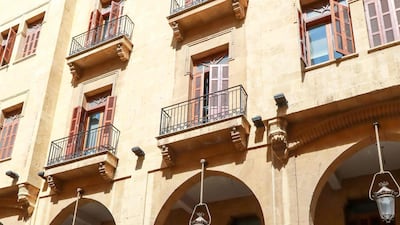Lebanon’s private sector growth dropped to an eight-month low in the second quarter of 2018 as political instability in the country curbed demand, with companies expecting a continued decline in business.
The Blom Lebanon Purchase Managers' Index, an indicator of business health, fell to 46 in June from 46.4 in May, reaching the worst level since October 2017, according to the report. The figure has remained persistently below the 50-plus mark that reflects growth as output and new orders contracted at a faster rate in June.
“Private sector activity continues to deteriorate,” said Marwan Mikhael, head of research at Blominvest Bank.
The country's economy has been battered by political divisions and a six-year war in neighbouring Syria during which an influx of refugees stretched Lebanon's public finances and infrastructure. The nation also has one of the world’s highest ratios of debt to gross domestic product, standing at more than 150 per cent. Last month, the International Monetary Fund urged Lebanon to take immediate action to improve the sustainability of its public debt by increasing value-added tax rates, restraining public wages and gradually eliminating electricity subsidies.
The private sector outlook remains depressed with firms expecting a drop in business during the next 12 months, the report showed.
As business activity contracted and fewer new orders came in, companies slashed jobs and cut back on purchasing in June. The rate of decline in firms’ buying accelerated to the fastest pace since October 2016.
________________
Read more:
IMF expects GCC economic growth to pick up
As Lebanon heads to polls IMF regional chief calls for fiscal discipline
IMF says global growth to slow in medium term as it warns of trade war harm
________________
Average prices of goods and services fell further in June as demand remained subdued. The cut in prices was the fourth in as many months.
Cost pressures on businesses remained subdued amid a fractional increase in the price of purchased items and average salaries were unchanged month-on month, the report said.
Supplier delivery times were improved for the third consecutive month, owing to a lack of demand for materials, according to the report, which is a joint survey by Blominvest Bank and IHS Markit.
Earlier this month, credit rating agency Moody’s said Lebanese banks' profitability will take a hit in the next 12 to 18 months from subdued business activity, higher provisions costs from low levels in 2017 and higher taxes.
The credit agency said the country's economy grew 1.9 per cent in 2017 and forecast a "modest" rise in GDP growth of 2.5 per cent this year and 3 per cent next year. This outlook is based on expectations of greater economic policy coordination and that the government will resume long-delayed public investment projects.
The rate of economic growth, derived from the PMI, is only 1.3 per cent in the first half of 2018, according to Mr Mikhael.
He called for a quick formation of a new government and the urgent need for economic reform to restore confidence in the economy and attract investors.


